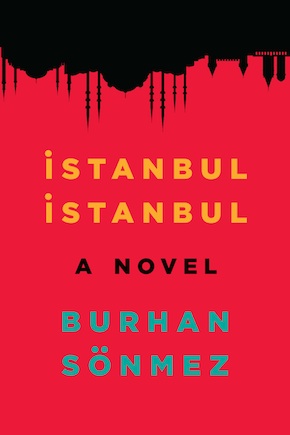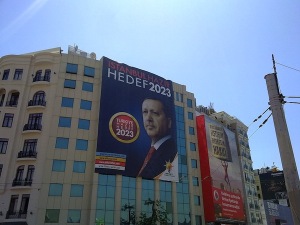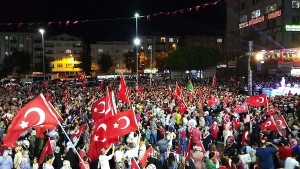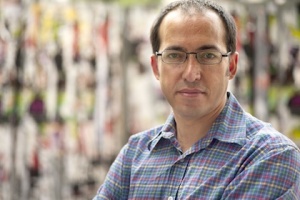Burhan Sönmez: Istanbul light and dark
by Mark Reynolds
“A writer of passion, memory and heart, Sönmez revives not only the stories of a land but also its bruised conscience.” Elif Shafak
Burhan Sönmez’ latest novel Istanbul Istanbul is set in a cramped two-by-one-metre prison cell beneath the teeming city, where a student, a doctor, a barber and a frail activist regale each other with stories, parables and riddles to fill the time between brutal interrogations. Readers are transported from the oppression of the dingy cell by the power of the human imagination as the men pluck joy, humour and compassion from their dire circumstances. Sönmez tells me how he was able to draw on his own experiences to depict the best and worst of humanity.
MR: How did you yourself end up in a similar underground cell when you were a student?
BS: It was a few years after a military coup in Turkey, emergency law was imposed and everything was banned, even a simple press statement couldn’t be released. A few of us decided to share our opinion with the dean of our school about the exam system, which was very unfair. But to act as a group at the time of the military coup was taken as an illegal movement, so the secret police began rounding everyone up. I was blindfolded, then put in a cell with a few people. I was young in their eyes: I was 19, they were in their 20s or 30s, and everyone was accused of something similar. One of them was a journalist, another was a disabled construction worker, who couldn’t walk because of a work accident, and another was a very active socialist militant. We were sharing the same place and also the same fate.
And were you sharing stories too?
Sure. On my first day – the others had been there for weeks, months – I remember the journalist said, “OK, now I will tell you a story, and you can tell your story afterwards.” Even when we talked about real things, for example our stories of love, it was as if we were talking about something fictitious, something just taken from a movie or from a book. Maybe it was something that our brains were playing with, as an escape from that painful place.
This incident of telling stories in a torture cell was in my mind for as long as I remember, certainly as long as I’ve been writing.”
Were there beatings and interrogation in between? And how long did your incarceration last?
They take you to an ‘interrogation room’, which means torture room. And when they finish their work on you for the day, which can take anything from four to fifteen hours, then they put you back in the cell because they need you to be healthy in order to be able to resume their torture. They let you rest, sleep and eat, and then they come to pick you up again. From our faculty, I think we were 16, and half of us were released after a few weeks, and most of the others were released a few days later. Two were detained for up to a year.
At what point did you decide to use this bleak setting as the basis for the novel?
This incident of telling stories in a torture cell was in my mind for as long as I remember, certainly as long as I’ve been writing. The question for me was that the frame story was OK, but what should I combine it with? And my idea was to tell the story of the city of Istanbul itself as an independent being, what the city means for people who live in it – and beneath it.
What made you decide to structure it with overlapping stories winding through ten days?
The Canterbury Tales, The Decameron and One Thousand and One Nights all use a similar type of frame story: people are sharing the same destiny or the same journey, and they begin to tell stories in order to pass the time. It’s also a kind of liberation, to save you from pain, from the danger of death. Or maybe you’re just playing with time.
You grew up in the Anatolian countryside. What were your earliest impressions of Istanbul?
Probably my first impressions were from the movies I saw that took place or were shot in Istanbul. And also in the fairy tales told by my mum in Kurdish, about a boy and a girl who marry and the live in a manor house in the middle of the desert, between the black sea and the white sea – in Turkish we call the Mediterranean the white sea. In the fairy tales whenever my mum described a beautiful city she would say, “They arrived in a city as beautiful as Istanbul.” Istanbul was always held up as an example of beauty.
In Turkey, nothing official works. It’s like a display window: you see very nice clothing in the window, but if you go into the back room people are in rags. There’s exploitation, violence, dark places, but the lights are all on the display.”
And when you arrived in the city at the age of 17, did it live up to expectations?
Yes, I think so, because Istanbul promises everything. Even if it gives you nothing, at least you have a taste of everything, or a view of everything, at least you’re in the middle of that potential world.
How many years did you practice as a lawyer, and why did you give it up?
For five or six years I was very happy as a lawyer, but after an incident with the police that left me with brain trauma and many fractures, I started having operations and treatments abroad, and I began to write. I was in exile in Britain, so I didn’t have a chance to practise law, because Turkish certification doesn’t work here. So I decided my future is with books, not with law anymore. I began to write down some stories in 1997, one year after the police incident. When I read them back I decided that I could write a novel. I had the plot of my first novel, North, then I got so many ideas for novels, I began to make a list.
Why did the police come after you?
I was very much involved in human rights cases at the peak of civil war in Turkey in the 1990s, and that was enough to make you a target in the government’s eyes. We have similar problems in Turkey today. If you are openly against the government, criticising them, they don’t see it as a democratic value, they just see you as an enemy, and they do anything to destroy you, to get you out of their way.
The translated edition has come quite soon after the book’s original publication in Turkish, and Ümit Hussein has already started translating your next book, which you haven’t finished yet. Did she do the same with Istanbul Istanbul?
More or less the same, yes. With the new novel, I finished the first draft, I know the beginning, the end and the whole arc of the story, but of course you always make minor or major changes. But I’m lucky that I have a translator who I’m very close to. Sometimes I take advantage, but she likes to work that way I think.
How did you come to work with Ümit?
It was a happy coincidence – or maybe fate. At first I approached Moris Farhi, this was about ten years ago, to ask if he was interested in translating books from Turkish to English and he said, “No, I’m too old, I only have time to work on my own novels!” But he was kind enough to introduce me to Ümit, who he said was a great translator and so we began to work together.
What’s the next book about?
It’s about a young Turkish blues singer in Istanbul who finds himself in hospital just waking up and he’s told that he’d tried to commit suicide. He doesn’t remember anything about himself, even his name, but he remembers everything about the city, and about Turkish society and the history of the world. He knows English football teams, Italian Renaissance paintings, but he can’t recall anything about his personal life. So he begins to think about what could have taken him to the brink of suicide. The main idea for me is to look at the memory of a person and of society, because at the moment in Turkey politics is playing with our memory. Some political parties or groups say our real history goes back to Ottoman times, others say it’s religious history, others say no, it’s history of the Republic and the establishment of a civil code. What makes society what it is? What makes a person what he or she is? And what’s the unity of mind and body? All these themes and questions run through the story.
 When the student Demirtay is recounting the story of being alone in hiding, he is reading Memed, My Hawk by Yaşar Kemal. What is the significance of that book?
When the student Demirtay is recounting the story of being alone in hiding, he is reading Memed, My Hawk by Yaşar Kemal. What is the significance of that book?
Yaşar Kemal has been like the emperor of Turkish modern literature, of the Turkish novel, and Memet, My Hawk has been a legendary book since the 1950s. Every generation since has been fascinated by it. I read it when I was a teenager, about 14 or 15 years old. It’s about a young peasant who fights against the local landowner, then against the military, and escapes with his beloved, who is then captured and imprisoned. In the end, as a reader, and as a citizen of Turkey, you fall in love with that hero, and with Yaşar Kemal himself.
When I was writing those chapters, some reviews in Turkish papers mentioned me as “the new Yaşar Kemal”, and Kemal sent word that I should ring him. He was nearly 90 years old – we lost him just last year, aged 91. We exchanged a few words in Kurdish, then he said, “So why haven’t you called me before?” I said, “How can I dare to call you?” And he said, “OK, you are coming to see me.” I said, “OK, when?” And he took a pause and said, “Tomorrow morning.” So I went to see him the next morning and spent the whole day with him at his home. It was such a privilege.
My next question was going to be ‘who are your literary heroes?’ But I think you may have just answered that.
Yes, Yaşar Kemal is top of the list in Turkey, though generally for me Turkish poetry is stronger than Turkish fiction. Maybe it’s not good to compare them, but I can openly say my heart was first caught by poetry.
Do you have any political heroes?
So many, from Mandela to Gandhi, from Che Guevara to Tolstoy, maybe Tolstoy nowadays more than anyone because as I read more about him, I think he’s the one I’m closest to politically. He was very pacifist, against any kind of violence. In the beginning he had other views, but later on he said, no murder, no violence, and no communication with the state.
Turkey is officially a democratic, secular and unified state. To what extent is that description accurate?
 In Turkey, nothing official works. It’s like a display window: you see very nice clothing in the window, but if you go into the back room people are in rags. There’s exploitation, violence, dark places, but the lights are all on the display.
In Turkey, nothing official works. It’s like a display window: you see very nice clothing in the window, but if you go into the back room people are in rags. There’s exploitation, violence, dark places, but the lights are all on the display.
How do you see Turkey’s political future untangling? Is the country doomed to repeat the errors – and terrors – of the past?
I think everybody sees that Turkey is on the wrong path at the moment. Our political leaders are trying to repeat Ottoman history, they believe they are not the government of a republic but the sultans of a palace. But any attempt to repeat history will bring disaster, not only for those at the top, but for the whole country. Erdoğan will go away, that’s not my problem. But when he and his government are no longer around, what will they leave behind, a ruin or a paradise? Unfortunately they are ruining our country.
So what should the international community be doing do to help? And what in particular is PEN International doing?
PEN International has been doing very good things. I became a member of the board at PEN last week. We have plans to do some new work in Turkey and there will be a press release very shortly. For the international community I can say one thing in particular: the government wants us to be isolated from Europe and from the rest of the world, but for people like me, the whole society of Turkey should feel that they are not alone in this world. There are good people in England, in Scotland, in China, in South Africa, in Latin America, everywhere. Just as US citizens should feel that they will not be alone under Donald Trump; they have so many good friends around the world. I believe we are all members of the same nation, speaking different languages. Barriers or borders shouldn’t be important for us. They are important for governments and for companies, but not for people who live in a peaceful way in their own home.
Erdoğan will go away, that’s not my problem. But when he and his government are no longer around, what will they leave behind, a ruin or a paradise? Unfortunately they are ruining our country.”
What’s the state of the media in Turkey today?
Unfortunately I can’t say any good thing about this. It has always been bad, but the word ‘bad’ is not enough since the 15 July coup attempt. The government took advantage and declared a state of emergency, and they are doing everything to silence the opposition. They closed down more than a hundred media outlets, nearly 200 journalists and writers are in prison. Thousands of judges and thousands of academics, and more than 30,000 citizens have been imprisoned in recent months.
What are your hopes for the coming months and years?
I think the government has very bad plans for our future. But personally I’m very sad but also hopeful. Because I believe there is no future in Turkey for that kind of violent and greedy government. Right now they are using all the power they have, but they will not get another term in office. Everything they’ve given us is decaying, but they say we’ve got an economic boom. What boom? They’ve got only one thing: constructing new buildings, they’ve got the whole economy turning on that sector.
If you are not a Turk, not Sunni or not a man, you are subject to all kinds of oppression. Even though through history in every country it has always been normal to have different parties, different ideas and opinions in politics, today they say your different opinion is not normal: you are either a friend or my enemy. In democracy we have different ideas but we are not enemies, we are just different. Your colour is your colour, my colour is my colour, let’s compete as equals. Their mentality doesn’t get that.
 Going back to construction for a moment, some of the present construction is also misguided, like the plans for the train station in Istanbul.
Going back to construction for a moment, some of the present construction is also misguided, like the plans for the train station in Istanbul.
The government occupies the most beautiful parts of Istanbul and other cities, they took them from public use and turned them to private use. Haydarpaşa train station if you ask me is the central point of Istanbul, connecting Istanbul with the rest of Turkey. When you come out of the station, you see the sea, and at the bottom of the stairs a ferry takes you across the Bosphoros to the European side. After fire damage, they closed the train station and plan to turn it into a fancy hotel. There are now organisations under the banner Haydarpaşa Solidarity set up to save the station. The government denies the hotel plan, but then why don’t they reopen it as a train station?
There are so many places in Istanbul that need to be protected. The most famous is Gezi Park. We have only this one small park in the centre of the city, and about three years ago the government decided to build a shopping mall there. One day they began to cut the trees, and people suddenly came onto the street and there was a big uprising for a couple of weeks across Turkey. More than ten million people took to the streets, and the park was saved. Now Haydarpaşa station has a similar problem and we’re watching very closely.
It’s at least encouraging that that number of people can be mobilised.
Yes, there are certain groups of people who can be mobilised, but we have to be alert.
How do you currently divide your time between Turkey and the UK?
I was in the UK for ten years from 2000 to 2010, and then for about three years I lived in Cambridge and Istanbul about half-and-half. Since 2013 mostly I live in Istanbul, but I come here every couple of months and it’s good to be here often.
So where is home?
Three places I call home: the village in Haymana Plain in Anatolia where I was born, Istanbul where I studied and worked, and Cambridge where I spent ten years of my life. I could die in any of them. In my second novel, Sins & Innocents, the protagonist says that when you ask people where they would like to die, their answer will be the place that is the home in their heart.
 Burhan Sönmez is a prize-winning novelist whose works have been translated into over twenty languages. He was born in Central Anatolia in 1965 and later moved to Istanbul where he worked as a lawyer. He was a founder of the social-activist cultural organisation TAKSAV (Foundation for Social Research, Culture and Art) and wrote on literature, culture and politics for various newspapers and magazines. Sönmez was seriously injured following an assault by Turkish police in 1996 and had to receive treatment in Britain, where he remained in exile for several years. His previous novels are North (2009) and Sins and Innocents (2011; Garnet, 2014). He is now based in Istanbul and lectures at METU University in Ankara on literary theory and the novel. He is member of English PEN and Turkish PEN. Istanbul Istanbul, translated by Ümit Hussein, is published in the UK by Telegram.
Burhan Sönmez is a prize-winning novelist whose works have been translated into over twenty languages. He was born in Central Anatolia in 1965 and later moved to Istanbul where he worked as a lawyer. He was a founder of the social-activist cultural organisation TAKSAV (Foundation for Social Research, Culture and Art) and wrote on literature, culture and politics for various newspapers and magazines. Sönmez was seriously injured following an assault by Turkish police in 1996 and had to receive treatment in Britain, where he remained in exile for several years. His previous novels are North (2009) and Sins and Innocents (2011; Garnet, 2014). He is now based in Istanbul and lectures at METU University in Ankara on literary theory and the novel. He is member of English PEN and Turkish PEN. Istanbul Istanbul, translated by Ümit Hussein, is published in the UK by Telegram.
Read more.
burhansonmez.com
brhnsonmez
Author portrait © Kaan Saganak
Mark Reynolds is a freelance editor and writer, and a founding editor of Bookanista.
@bookanista
wearebookanista

